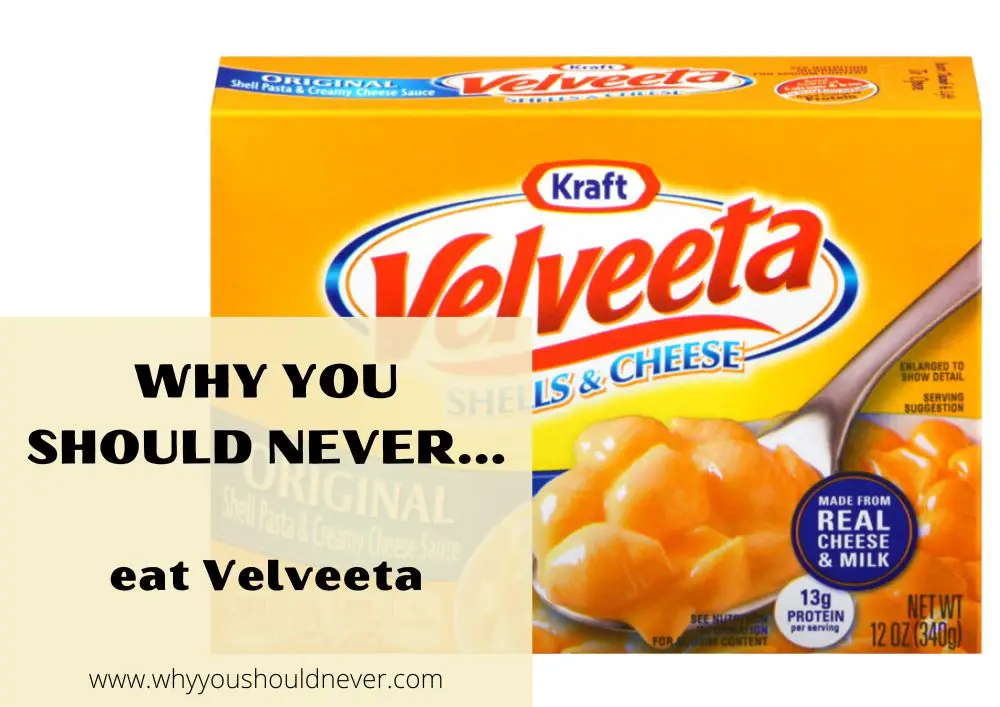![]()
Why You Should Never Eat Velveeta
Hey there, food lovers! What if I told you the creaminess of your beloved mac ‘n’ cheese might not be all it’s melted up to be?
Yes, today we’re talking about the infamous Velveeta – the neon orange “cheese product” that’s snuck into way too many American kitchens.
Now, don’t get me wrong, I’m not here to yuck your yum, but it’s important we peek behind the glossy, plastic wrap of this melty goodness.
So put down your nachos, stash away that casserole dish, and let’s delve into the reasons why you should probably give Velveeta a miss.
6 reasons why you shouldn’t eat Velveeta
1. It’s not real cheese
This is your captain speaking, and we’re in some serious cheesy turbulence. Although it dresses up as cheese, Velveeta is actually a “cheese product”. This term is a bit of a euphemism, meaning it doesn’t meet the FDA’s standards to qualify as real cheese.
In fact, its official title is “pasteurized prepared cheese product.” Essentially, Velveeta’s a bit like a pretty convincing impostor – it talks the talk but doesn’t walk the walk.
2. Lots of crazy ingredients
Have you ever taken a good look at what’s in Velveeta? It’s a cornucopia of stuff that you’d never find in an artisanal cheese shop.
We’re talking milk, water, whey protein concentrate, milk protein concentrate, sodium phosphate, and – my favorite – “contains less than 2% of” a laundry list of ingredients.
That “less than 2%” adds up to a whole lot of artificial colors, milk fat, salt, sodium alginate, lactic acid, and sorbic acid. It’s less “farm to table”, more “lab to table”.
3. Saltier than a pirate’s language
Your taste buds might enjoy the assault, but your blood pressure? Not so much. A single ounce of Velveeta has a whopping 410 mg of sodium – that’s about 18% of your recommended daily intake! If you’re trying to keep your heart healthy, this is one salty sea you might want to steer clear of.
4. It’s indestructible
No, seriously. Ever noticed how Velveeta doesn’t mold? While this might seem convenient, it’s a bit unnerving.
Real food decomposes, goes bad. Velveeta, however, seems to have found the secret to eternal youth, thanks to all of the preservatives it’s packed with. It will probably outlive us all!
And if it’s not aging, what exactly is it doing? More importantly, what’s it going to do inside you?
5. The taste factor
This might ruffle some feathers, but let’s face it: There are far tastier cheeses out there. Once you’ve experienced the sharp tang of a good cheddar, the creamy luxury of brie, or the nuanced flavor profile of a well-aged gouda, it’s hard to go back to Velveeta. So expand your horizons, cheese lovers. Your taste buds will thank you.
6. Processed to oblivion and beyond
Let’s be real here, the majority of highly processed foods, Velveeta included, are not your friends when it comes to overall health. Remember our little peek at the ingredients list earlier? Those long, hard-to-pronounce components aren’t there for kicks. They’re the outcome of a heavily processed concoction.
Unlike traditional cheese, which requires a straightforward process of fermenting milk, Velveeta requires a science degree to decipher its creation.
Your body wasn’t designed to break down artificial additives and complex chemical compounds. It craves wholesome, natural ingredients, and frankly, it deserves better.
Alternatives to Velveeta
There are plenty of healthier and tastier alternatives to Velveeta that you can incorporate into your meals. Let’s take a gander:
Real Cheddar Cheese
If you’re after that full-bodied flavor, nothing beats real cheddar. Whether you’re making a sauce, a sandwich, or a decadent topping, cheddar is versatile and delicious. Opt for sharp cheddar if you want a more pronounced flavor.
Monterey Jack
For a creamy, easy-melting cheese that’s perfect for quesadillas, nachos, or casseroles, Monterey Jack is a solid pick. It has a mild flavor, which makes it a great canvas for adding your own spices or other flavors.
Colby Cheese
A close cousin to cheddar, Colby is a semi-hard cheese that’s mild and creamy. It’s great for melting and offers a much better nutritional profile than Velveeta.
Gruyère
If you’re looking to level up your cheese game, Gruyère is a fabulous choice. This Swiss cheese is renowned for its melting properties, making it perfect for gratins, fondue, and gourmet grilled cheese sandwiches.
Provolone
Provolone is another cheese known for its excellent melting capabilities. It has a slightly tangy taste, adding an extra layer of flavor to your dishes.
American Cheese
If you still want that processed cheese flavor, but with less of the extra stuff found in Velveeta, try deli-style American cheese. Many delis sell varieties with fewer additives and preservatives, making them a slightly healthier alternative.
Final word
In the end, I’m not saying you have to banish Velveeta from your life forever. Sometimes, nothing hits the spot like a gooey grilled cheese or a comforting bowl of mac ‘n’ cheese. But maybe it’s time we stop turning a blind eye to what we’re actually eating and start embracing the world of real, wholesome, and ridiculously delicious cheese.
Velveeta, it’s been… memorable. But we’re ready to see other cheeses.
